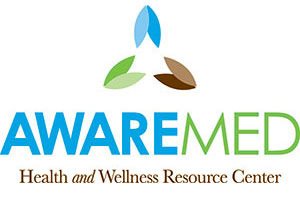Adenomyosis Treatment in Hickory, NC
What Is Adenomyosis?

Adenomyosis uteri is a gynecological medical condition characterized by the movement of endometrial tissue into the myometrium—the uterus muscle. The condition causes the uterine wall to thicken and often contributes to heavy or extended menstrual cycles, as well as pain during your period or sexual intercourse.
Unlike endometriosis , which causes endometrial tissue to grow outside of the uterus and can spread to the ovaries, pelvis, and other areas of the body, adenomyosis growth is confined to the inside of the uterus.
Treatment is available to alleviate adenomyosis pain and ranges from at-home treatments to surgery. To schedule a consultation with a healthcare practitioner in Hickory who specializes in adenomyosis treatment, call (423) 482-8711 or contact AWAREmed Health and Wellness Resource Center online.
Adenomyosis Causes
The exact cause of adenomyosis is unknown; however, increased estrogen levels are thought to play a role, which may explain why adenomyosis typically disappears after menopause.
Other potential adenomyosis causes include:
- Invasive growth of abnormal tissue from endometrial cells that pushes into the uterus
- Bone marrow stem cells that invade the uterine muscle walls
- Post-childbirth inflammation in the uterus
- Pre-birth origin; endometrial tissue developed in the uterine muscle when the uterus first formed in the fetus
Your risk for developing adenomyosis increases with age, women between the ages of 40 and 50 most often develop adenomyosis symptoms. Childbirth and uterine surgery—like a cesarean section or fibroid removal—can also increase your risk.
Adenomyosis Symptoms
Adenomyosis often begins without symptoms or presents as mild discomfort. As the uterus continues to grow, additional adenomyosis symptoms may develop, including:
- Heavy or prolonged menstrual bleeding
- Severe cramping or sharp pain during periods
- Pain during intercourse
- Blood clots during the menstrual cycle
- Spotting between periods
- Tenderness in the abdominal area
Adenomyosis pain and discomfort often begin in the late childbearing years and typically disappear approximately 12 months after menopause.
Adenomyosis Diagnosis
The first step in diagnosing adenomyosis often begins with a physical exam, particularly of the pelvic area. The pelvic exam may reveal an enlarged and tender uterus. An ultrasound can be used to rule out other conditions with similar symptoms. If the ultrasound fails to confirm an adenomyosis diagnosis, your healthcare practitioner may recommend magnetic resonance imaging (MRI) to get a better view of your uterus and any potential problems.
Adenomyosis Treatment Options
Adenomyosis treatment is dependent on the severity of your symptoms. Mild forms of adenomyosis may require no medical treatment, and instead, symptoms can be controlled through lifestyle changes and at-home remedies. Over-the-counter anti-inflammatory medications such as ibuprofen can help to control your pain during your menstrual cycle. Soaking in a hot tub or using a heating pad on the abdominal area may also help ease mild pelvic pain and cramping.
Traditional Adenomyosis Treatments
For adenomyosis symptoms which interfere with your daily functioning, your healthcare provider may recommend:
- Hormone treatment: progesterone treatment, combined estrogen-progesterone birth control pills, or vaginal meshes may lessen heavy bleeding and pain.
- Uterine artery embolization: this minimally invasive procedure blocks the blood vessels that provide blood flow to the region, causing the adenomyosis to shrink.
- Endometrial ablation: a minimally-invasive procedure that minimizes the lining of the uterus.
- Hysterectomy: a surgery that removes the uterus; this is the only treatment considered to cure adenomyosis.
Natural Uterine Adenomyosis Treatments
To alleviate your pain without the use of medications or medical procedures, your healthcare practitioner may recommend:
- Ginger, which contains gingerols (powerful antioxidants that provide anti-inflammatory activity and keep the uterus functioning normally), can help to relieve the pain of menstruation.
- Turmeric, which contains curcumin, helps reduce inflammation and decrease excessive bleeding during menstruation.
- Magnesium, which helps reduce menstrual cramping, can be taken as a supplement in addition to using Epsom salts when soaking in a tub.
- Shepard's Purse, a botanical that constricts blood flow during menstruation. Note: Shepard's Purse causes uterine contractions and should be avoided during pregnancy.
- Vitex, a botanical that helps balance out estrogen production.
- Aloe vera, consumed as a juice or gel, to help relieve pain by reducing the pressure in the uterus and prevents menstrual cramps.
Although adenomyosis can be a painful condition, there are many effective remedies to help alleviate your pain and discomfort. To meet with a practitioner in Hickory who can discuss adenomyosis treatment options with you, call (423) 482-8711 or contact AWAREmed Health and Wellness Resource Center online.
AWAREmed Health and Wellness Resource Center
Address
1604 Lamons LaneSuite 202
Johnson City, TN 37604
(423) 482-8711
www.awaremed.com
Hours
Mon:
9:00 am - 5:00 pm
Tue:
9:00 am - 5:00 pm
Wed:
9:00 am - 5:00 pm
Thu:
9:00 am - 5:00 pm
Fri:
9:00 am - 5:00 pm

